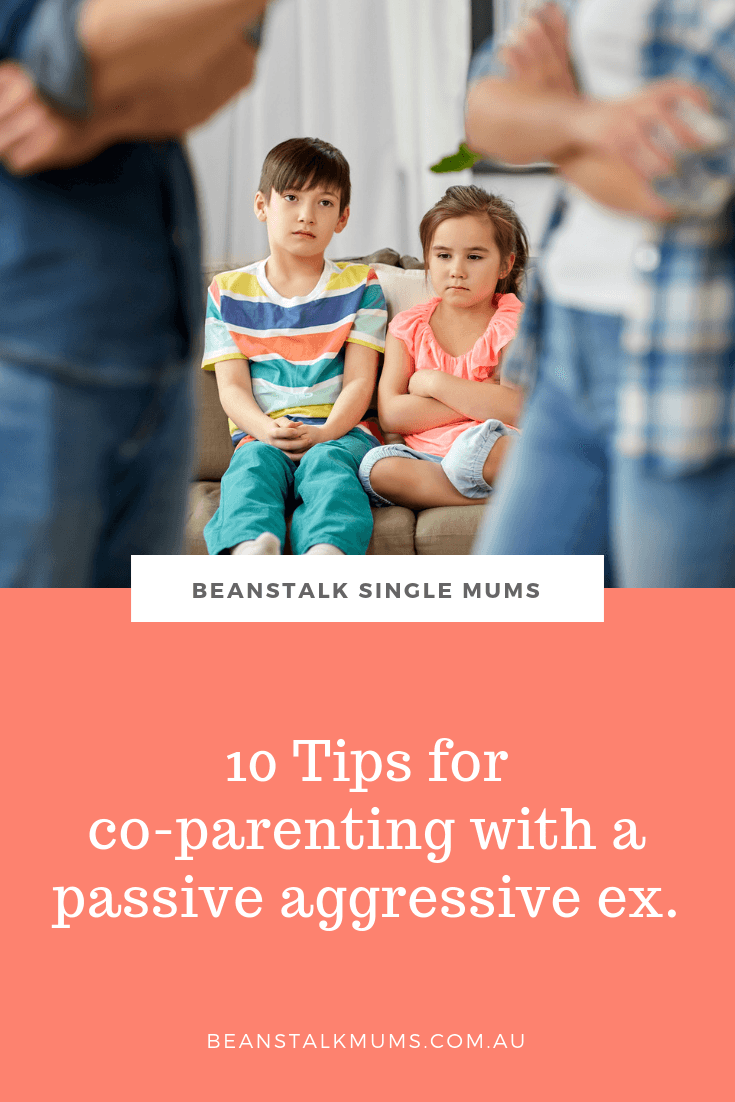
10 Tips to co-parent with a passive aggressive ex.
‘CO’ means ‘joint, mutual, common, together’ but is ‘CO’ possible when your ex is passive aggressive?
Just as painful and equally damaging to you and your kids as other more obvious forms of conflict, the covert hostility of passive-aggression can make the co-parenting relationship a living hell.
Angela North, psychologist and play therapist says:
‘Trying to co-parent with a passive-aggressive ex-partner can be a nightmare of boundaries crossed, reasonable requests ignored and constant, negative interactions.’
WHAT IS PASSIVE AGGRESSION?
Passive aggressive behaviour is a deliberate but covert way of expressing anger, disagreement or other strong emotions. Non-confrontational or passive resistance to the reasonable demands or expectations of others. Appearing to comply or act appropriately then behaving negatively. It’s an attempt to control a situation without taking responsibility and can include:
- Procrastination
- ‘Forgetting’
- Lateness
- Intentional ineptness
- Pretending not to see / hear
- The silent treatment & withholding
- Being obstructive or argumentative
- Blaming, making excuses or playing the victim
- Denial & shutting down
- Resentment
- Complaints
- Sulking
- Pay back & revenge
- Backhanded compliments
- Sabotage
- Scornful & critical of authority
- And, what I call the ‘smiling assassin’– agreeing to requests or plans but then failing to follow through.
In a nutshell, passive-aggressive people avoid confrontation, refuse to state their needs or concerns openly and don’t express intense emotions (especially anger) directly. They offer indirect resistance to the demands and needs of others and, while they often appear calm and congenial, harbour underlying, unexpressed anger. Often, they don’t communicate well (or at all).
HOW DO YOU CO-PARENT WITH A PASSIVE AGGRESSIVE PARTNER?
So, how do you co-parent with your passive-aggressive ex? One of the most effective means of dealing with passive-aggressive behaviour is to simply ignore and pretend you don’t notice – if it doesn’t noticeably bother you, the behaviour loses its power. But this just isn’t possible when you are co-parents and there are children affected so… here are some strategies to help save your sanity.
10 TIPS TO CO-PARENT WITH A PASSIVE AGGRESSIVE EX
1. RECOGNISE THE SIGNS
Passive-aggressive behaviour is covert, so can be hard to recognise. Learn to identify the passive-aggressive strategies your ex-partner engages in, along with how you typically react to them. Know and be watchful for passive-aggressive behaviours. Learn to recognise how you FEEL (angry, disappointed, frustrated, confused, disempowered) when your ex’s passive-aggressive behaviour kicks in and be mindful of what happens in your body. Do you make fists with your hands or clench your teeth? Does you heart race? By learning to catch yourself reacting, you can choose how you respond.
2. ACCEPT WHAT IS YOURS
While you do not have to accept the passive-aggressive behaviour of your co-parent, you will need to accept that you can’t change it. You can only manage your response. Accept that there will be denial from the other party. Don’t argue or defend when your co-parent denies being angry or acting passive-aggressively. Simply sharing your awareness of the behaviour and underlying hostility can be empowering, and sends the clear message to him or her that it’s not acceptable. Also accept your role in the story, how your behaviour contributes to the pattern and where you too may be passive-aggressive (Mmm, those back handed compliments … I used to be the queen).
3. REMAIN UNEMOTIONAL
Refuse to bite back or engage when your ex-partner is acting passive-aggressively. Overtly displaying anger or frustration diverts attention from the issue. Stay calm. Be clear and open about your emotions without becoming emotional. Focus on behaving and interacting in a way you most want from your co-parent – open, direct, honest, calm, clear and respectful – even if it’s not reciprocated. Do whatever you need to remain unemotional. Take deep breaths. Wait before responding to emails or messages. Let the phone go to voicemail. Remove yourself from the environment if you need to.
4. CALL IT OUT
Address the issue directly by saying ‘we have a problem’. Name the behaviour (hostility) and outline the consequences of it continuing, namely that it makes it difficult to be the best parents you can be to your kids. Be specific about what it is that your co-parent says or does that is upsetting and unacceptable. Accept (See #1) that calling it out may not be effective in reducing the passive-aggressive behaviour and may actually see it escalate. And of course, this can only be done if you feel safe to do so, and there’s no risk of greater abuse or violence.
HOW TO DEAL WITH A PASSIVE AGGRESSIVE EX (CONT.)
5. ONE AT A TIME
Angela says:
‘When communicating a need, want or expectation, stick to one request at a time. Do not move onto the next issue until the first one is resolved.’
It is much harder to avoid answering a question when there’s only one. Stick to facts and repeat as necessary. Calmly, assertively, unemotionally repeat your question, need or expectation.
6. PUT IT IN WRITING
Keep your co-parent fully informed (read: accountable) about the needs, plans and activities of the kids IN WRITING to minimise any ‘confusion’ or ‘forgetting’. Have a detailed parenting plan with clearly outlined pick up / drop off days and times, holiday arrangements. Include contingencies e.g. what happens if I child is unwell or plans need to be changed. Making pick up and drop off somewhere other than your house – school, day care, or a grandparents’ home – means being ‘accidentally on purpose’ late to pick up or drop off the children loses its power to frustrate or impinge on you. Be sure all other carers involved with your children are aware of the arrangements (and any changes to them) and who is responsible (i.e. not you). A shared calendar or parenting app is invaluable.
7. CONTAIN COMMUNICATION
Keep your communication businesslike and unemotional. Open. Honest. Direct. Clear. Solution focused and assertive. While assertive communication isn’t aggressive or attacking, your passive-aggressive co-parent may well feel it is, especially if they are unused to assertiveness from you. If engaging with your passive-aggressive co-parent becomes so fraught that it is unsustainable or damaging to your mental and emotional health (or if you are unable to keep it calm and reasonable) communicate in writing (text or email) only. Containing your communication also gives you time to respond in your best manner (calm, unemotional). If you can’t maintain civility when you cross paths, says Angela:
‘It’s far better to set boundaries so that children are not witness to anger and disrespect, however thinly veiled.’
8. ROCK SOLID BOUNDARIES
Co-parenting with a passive-aggressive ex-partner teaches you to set rock solid boundaries. Setting boundaries – clearly communicating what is and is not ok with you – and holding them firmly in the face of passive-aggressive behaviour is difficult and takes practice, but does not need to be done in a hostile manner. Use a calm, even voice and few but firm words. You will also need a good dose of patience and restraint. It can be as simple as saying ‘I will no longer allow you to speak to me like that. If you do so again I will hang up the phone.’ Set the boundary. Outline the consequences of crossing it. Follow through.
If the passive-aggressive behaviour occurs in front of the children you can say ‘this is not OK for the kids. I’ll remove them from this situation and explain to them why it’s unacceptable for you to do / say / behave like this.’ Walk or drive away. Close the door. Hang up the phone to hold your boundaries rock solid.
9. HOLD THE HIGH GROUND
Don’t talk badly of your ex. Ever. Even if he / she is disparaging you to the kids. Watch your body language, tone and choice of words when speaking to or even about him. Don’t let passive-aggression set the tone for your own parenting. Aim to become the best parent and co-parent you can be.
Angela suggests that if your children are frequently exposed to passive-aggressive behaviour from a parent, conversations about that behaviour can be useful, especially if the focus is on learning appropriate responses (coping strategies). Use non-judgemental language and focus on the behaviour, rather than the person (who is still the parent of your children and someone they love). She says:
‘If you find your ex consistently using passive-aggressive strategies, chances are your children will be experiencing it from that parent too. They need to know that there are constructive ways to respond, and healthier ways to communicate.’
Her biggest tip for helping your kids deal with passive-aggression is to keep a lid on your own reactions when they debrief with you.
‘Your distress distracts them from the process of managing their big emotions. They need to know they can tell you what they’re feeling about the other parent, and trust that you will listen calmly, do your best to understand their perspective, and not go running to the phone to ring your ex and express your frustration.’
Your kids need ONE parent demonstrating how decent, respectful relationships look and feel. Angela says:
‘If children grow up hearing one parent being critical and judgemental of another, they are more likely to normalise disrespect in their own future relationships.’
10. OPT OUT
Passive-aggressive exes can make collaborative, functional co-parenting impossible and, if this is your reality, a parallel parenting model where you have limited direct contact with each other, may be a healthier solution. Ongoing conflict takes two parties to engage. If you’ve done all you can, give yourself permission to opt out. Focus your attention and energy on yourself and your children, so you are no longer tortured by your ex’s behaviour.
Above all, passive-aggressive behaviour is about power and control. When dealing with a passive-aggressive ex-partner and co-parent, you need to unhook from the power struggle, learn to deal with your own fear of conflict or need to please.
Passive-aggression in a co-parenting relationship is harmful to your kids. Call it out if it’s safe for you to do so and control what you can – your own behaviour. Remember, remain calm. Set firm boundaries and consistently enforce them. Respond rather than react. Communicate clearly, concisely and assertively. Break the cycle by stepping away from the passive-aggressive behaviour, choosing to create a new pattern for your family.















